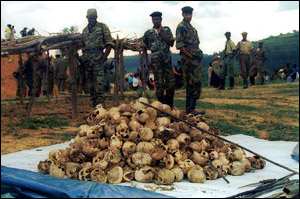|
On July 4th, 1994, Tutsi rebels seized Kigali. That's when United States troops finally arrived. Carl Wilkens still wonders why other nations didn't act to prevent the genocide from happening.
"When I got out, the genocide's over and the airport's crawling with American soldiers and stuff. For a long time I couldn't salute the flag. Why is it that good, decent people didn't do anything?"
 | The remains of several hundred Tutsi civilians who were massacred during the genocide were exhumed and reburied in Kaduha as a memorial to the victims.
photo by Corinne Dufka |
But though governments didn't act, some individuals did. What Pie Mugabo remembers most vividly of both Damas Gisimba and Carl Wilkens is their sense of humanity.
"Where the international community and the U.N. practically abandoned us, [they] came to our aid and took risks. I still owe [them] many thanks. In fact, we should give [them] cows. That is what we do in Rwanda for someone who has done something extremely kind, we give them cows."
About 150 children live in Damas Gisimba's orphanage today. Carl Wilkens is now pastor of an Adventist high-school in rural Oregon. Both men saved hundreds of lives during the genocide. They were few, but they were not alone
Workers for the International Committee of the Red Cross are credited for saving tens of thousands of people. Many others found protection from the small U.N. peacekeeping force. Near the end of the genocide, French troops moved into southern Rwanda to create a safe zone, but in a country the size of Maryland, 800,000 people were killed over the course of three months - an average of ten-thousand per day.
|

